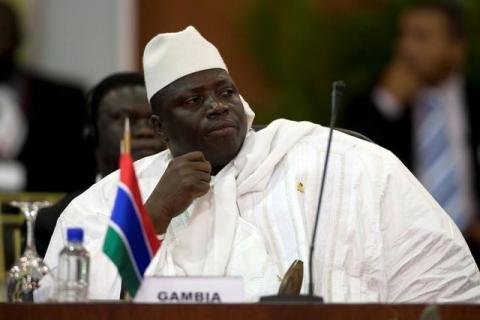Advertisement
Gambia's top court adjourns Jammeh's poll challenge
BANJUL (Reuters) - African judges due to help Gambia's supreme court hear a challenge by President Yahya Jammeh's electoral defeat last December failed to show up on Tuesday, forcing the chief justice to adjourn the session.
Chief Justice Emmanuel Fagbenle delayed the hearing until Jan. 16, meaning the court will hear the challenge filed by Jammeh's ruling APRC party only two days before the end of the long-ruling president's mandate.
Legal sources said the foreign judges named to the court have not yet arrived in the West African country.
Outside the courtroom, hundreds of people wearing green for the ruling APRC put on a show of support not seen since the polls for the eccentric and repressive ruler. Jammeh initially accepted his defeat but later questioned its validity.
"No to cheating," the crowd chanted, echoing Jammeh's speech rejecting the poll outcome.
The legal challenge has shone a rare light on the idiosyncrasies of Gambia's legal system, which opponents say has long been manipulated by Jammeh.
The supreme court has not sat in over a year, partly because would-be judges are too afraid of being confronted with unpredictable charges themselves. Two chief justices have been dismissed since 2013, one of them being arrested and jailed.
Because of this, the court hired four foreign judges from Nigeria and Sierra Leone to hear the appeal. But the absence on Tuesday of these "mercenary judges", as the opposition calls them, raised questions about that option as well.
A document seen by Reuters and signed by Nigeria's acting chief justice said that the timing of the extraordinary January session was "unfavourable". Gambia's supreme court normally sits in May and November.
Fagbenle confirmed the document and said he had received a similar one from the chief justice in Sierra Leone.
The question of whether the tiny country can overcome its current political impasse and instate President-Elect Adama Barrow next week is seen as a test case for African democracy in a region used to coups and autocratic rule.
The presidents of Nigeria, Sierra Leone and Liberia will visit Jammeh on Wednesday in a second attempt to press him to hand over power.
While many Gambians as well as Western powers have publicly called for Jammeh to step aside, and even hinted at removing him by force, the army and most of the cabinet have remained loyal.
Many Gambians are afraid of Jammeh's brutal security forces, who have been accused of locking up hundreds of opponents during his 22-year rule. Others believe he has mystical powers.
Jammeh boasts that he can cure both AIDS and infertility through herbal medicine.
(Reporting by Lamin Jahateh; Writing by Emma Farge; Editing by Tom Heneghan)



















Add new comment